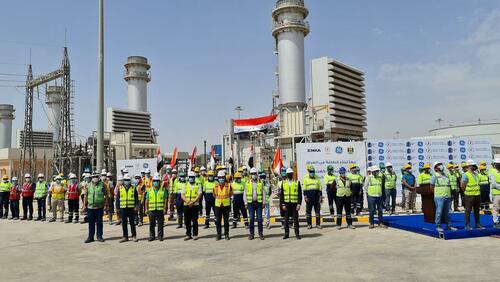PowerChina Wins $4BN Contract For Iraq’s First Major Seawater Desalination Facility
PowerChina has secured a $4 billion contract to build Iraq’s first large-scale seawater desalination plant in Basra, in partnership with local firm Al Ridha Group, Iraqi officials announced.
Iraqi Prime Minister Mohammed Shia al-Sudani attended the groundbreaking ceremony on Thursday for the Basra Seawater Desalination Plant, a Chinese-built facility with a planned capacity of one million cubic meters per day.

According to the premier’s office, the project is scheduled to enter commercial service in June 2028 and will include a 300-megawatt (MW) power plant to support operations.
The deal forms part of Baghdad’s response to worsening water scarcity in the south.
During construction, smaller desalination units will be deployed across Basra Governorate. These include the Shatt al-Arab station with a 5,000 cubic meter per hour capacity – equivalent to two Olympic pools per hour. The Al-Faw, Al-Siba, and Abu Flous plants will each produce 3,000 cubic meters per hour, while the Safwan plant will produce 1,000.
Beyond Iraq, China has expanded its infrastructure reach across West Asia through a series of state-backed investments in Saudi Arabia, Iran, and Turkiye.
In April 2025, Sinopec and Aramco Asia Singapore signed a $4 billion agreement to establish Fujian Sinopec Aramco Refining & Petrochemical Co., a joint venture to manage crude logistics at the Gulei Port zone in Zhangzhou.
The move supports Aramco’s plans to supply up to one million barrels per day for downstream projects in China.
Between 2021 and October 2024, China became the largest source of greenfield FDI in Saudi Arabia, investing $21.6 billion—one-third of it in clean energy.
In Iran, total Chinese investment since 2007 remains under $5 billion. Projects include the Yadavaran oil field, Tehran–Mashhad railway, Qazvin tramway, a €1 billion ($1.09 billion) solar project, and a $350 million steel plant. Plans involving South Pars were scaled back under US pressure.
China subsidized factories…US subsidized subprime loans & 20 years of losing wars in the Middle East (which helped secure Iraq’s oil for China.)
Who spent the subsidy money better? 🙂
— Luke Gromen (@LukeGromen) July 25, 2025
In Turkey, China Sunergy, Talesun, Yingli, and NARI have established solar production facilities. China Sunergy alone has invested around $600 million in Istanbul for photovoltaic (PV) exports to Europe.
Tyler Durden
Fri, 07/25/2025 – 17:40





